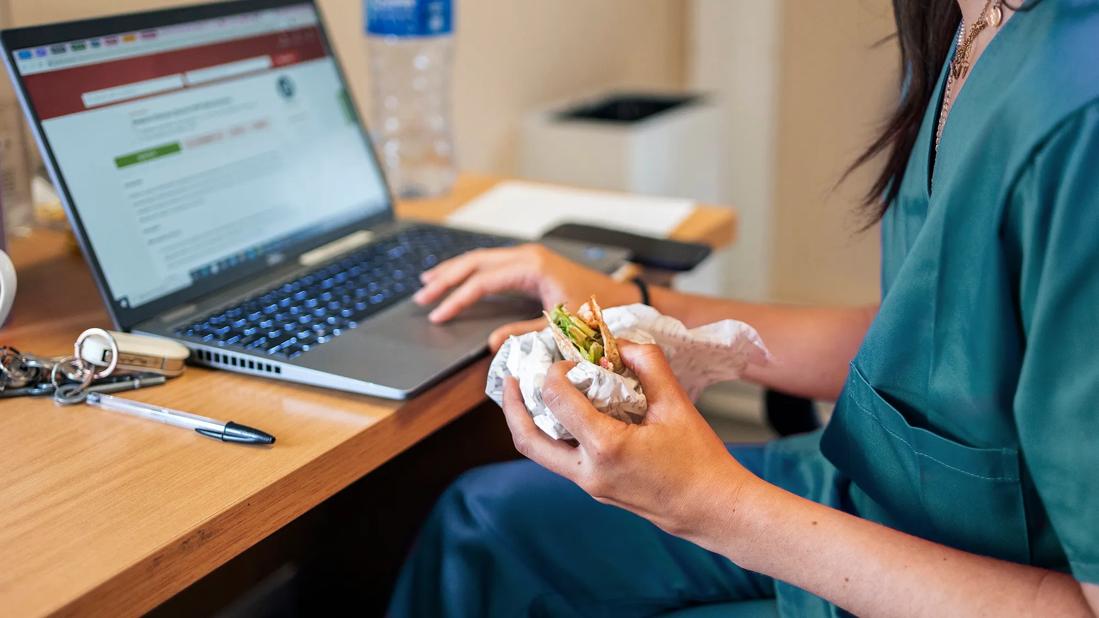Infectious disease outbreaks can place considerable stress on caregivers

Image content: This image is available to view online.
View image online (https://assets.clevelandclinic.org/transform/cc64c8c9-b745-4355-b1d7-d988f2554516/nurse-eating-lunch-between-breaks-1958406359)
Nurse taking a meal break
Infectious disease outbreaks like COVID-19 can place considerable stress on caregivers, many of whom play a vital role in the delivery of care — and information — to patients and their families, and within their communities. But it’s essential that caregivers remember to put their proverbial oxygen mask on first before caring for others.
Advertisement
Cleveland Clinic is a non-profit academic medical center. Advertising on our site helps support our mission. We do not endorse non-Cleveland Clinic products or services. Policy
The following tips were adapted from an article published by the American Psychiatric Association, encouraging caregivers to prioritize their own health during this global health crisis.
Hand washing, cough etiquette and social distancing are critical in preventing the spread of coronavirus. When appropriate, engage with patients, families, and with your social network to address misinformation. Perpetuating myths about the virus could have implications for accelerating transmission.
Rely on credible sources for guidelines and outbreak updates, like the Centers for Disease Control and Prevention and the World Health Organization. Also be mindful of new developments at state, regional and organizational levels. Having said that, monitor your own media exposure and find a balance that works. It’s very easy to get inundated with news. Consume enough to effectively manage care, but not so much that it begins to induce anxiety.
It goes without saying, taking care of yourself is essential to optimize your capacity to care for others. Now more than ever, make sure you are feeling balanced and well-fueled by eating and hydrating regularly, prioritizing good sleep hygiene and maintaining an exercise routine. Consider what healthy strategies keep you feeling your best.
Whenever it is reasonably possible, disconnect physically and mentally. Call a friend or family member, take a walk in your neighborhood or a lap at work. Start a new book or read an article that is unrelated to COVID-19. Find normalcy and comfort in everyday activities that are energizing and restorative — the work will still be there when you return, but you will be better equipped to handle it.
Advertisement
Are you feeling overwhelmed? Take inventory of your stress level, and consider personal and professional resources. You don’t have to manage this stress alone. Talk to friends and family. Reach out to colleagues or your supervisor for support. Your organization may have an employee assistance program or can advise on community healthcare partners who are trained to help caregivers manage stress.
Whether or not you are directly involved with managing care for infected patients, in times of crisis, caregivers are called on as leaders to promote public health, which can save lives. What you are doing matters. Above all, remember to be kind to yourself and recognize the contributions of your colleagues, other healthcare providers, and public health officials.
Coronavirus and Mental Health: Taking Care of Ourselves During Infectious Disease Outbreaks. Accessed March 16, 2020.
Coronavirus and Emerging Infectious Disease Outbreaks Response. Center for the Study of Traumatic Stress. Accessed March 16, 2020.
Advertisement
Advertisement
Patients report improved sense of smell and taste
Clinicians who are accustomed to uncertainty can do well by patients
Unique skin changes can occur after infection or vaccine
Cleveland Clinic analysis suggests that obtaining care for the virus might reveal a previously undiagnosed condition
As the pandemic evolves, rheumatologists must continue to be mindful of most vulnerable patients
Early results suggest positive outcomes from COVID-19 PrEP treatment
Could the virus have caused the condition or triggered previously undiagnosed disease?
Five categories of cutaneous abnormalities are associated with COVID-19